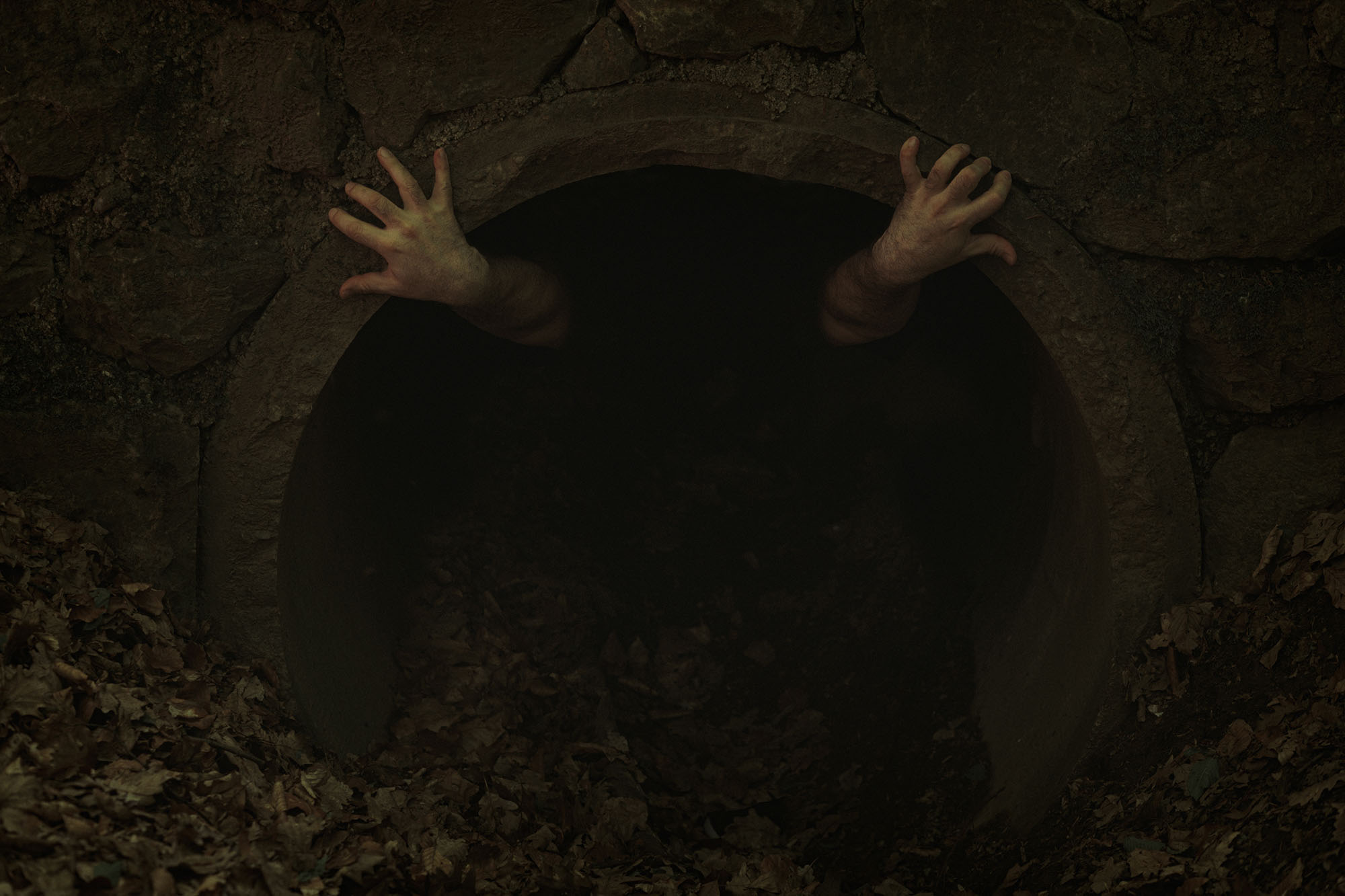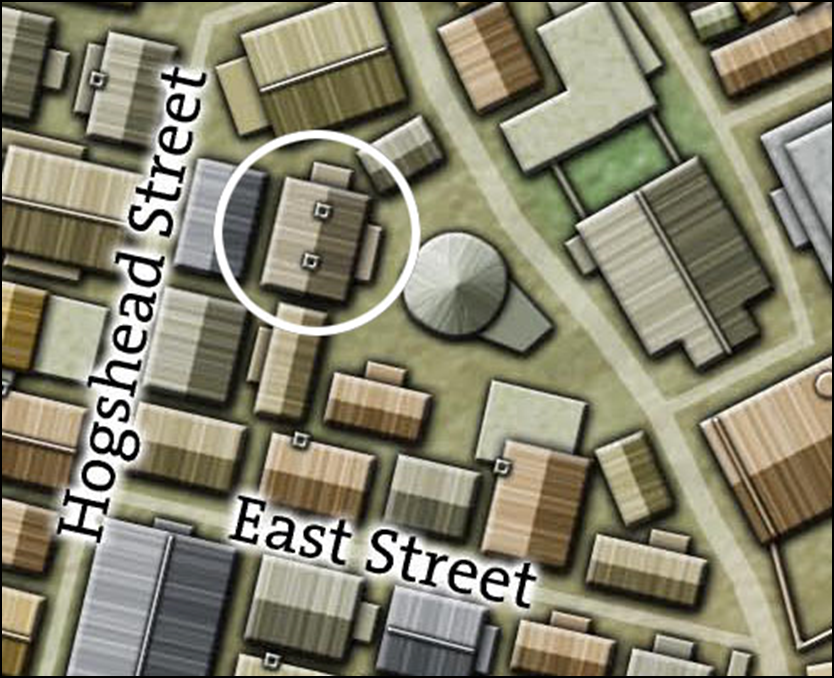 IN THE SHADOW OF THE SPIRE
IN THE SHADOW OF THE SPIRE
SESSION 42B: FALSE BROTHELS
October 17th, 2009
The 23rd Day of Kadal in the 790th Year of the Seyrunian Dynasty

TO THE BROTHEL?
They chose one of the mothers to lead them to the sewer entrance and left.
As they passed the corpse of the albino ratling, the mother sobbed.
“Who was he?” Elestra asked.
“He was our nest leader.”
“What does that mean?”
The mother looked confused. “He was the one who leads.”
She took them to a secret door. It swung open to reveal the familiar sights (and smells) of the Ptolus sewers. With a final hiss, the mother scurried away down the sewer corridors.
Turning the kennel rat loose, they followed its scuffling path through the sewers. As they neared the Warrens, they found that the tunnels – which were hardly an orderly place to begin with – slowly turned into a chaotic nightmare. Tee explained that they were moving into an older sewer system: The Warrens, near as they were to the Docks, were one of the oldest portions of the city (it had been a shanty town when Ptolus itself had been confined to the fortified area known now as Oldtown). Like Oldtown, several mismatched sewer systems had been built beneath the Warrens (although these were generally of even poorer quality). And during the massive construction project in the first century YD in which sewers were built under the rest of the city, the older sewer system had simply been connected to the new – resulting in a completely chaotic maze of interlocking, half-designed tunnel systems.
Fortunately, the kennel rat seemed to know its way. At one intersection, however, it paused and waited for direction. Their maps from the temple indicated that there were multiple routes, and Agnarr confirmed that this was trained behavior: It was waiting for its handlers to choose between multiple routes. They thought the likelier route lay to the south, and so Agnarr dutifully pointed the kennel rat in that direction.
A little later the rat led them through a broken patch of wall. In the tunnel beyond it they recognized the distinctive – yet destitute – construction of Ghul’s Labyrinth. Tee waved the others back and scouted ahead. After a short distance down the passage of pale, begrimed stone, several loud and raucous voices could be heard echoing toward her.
Stealing forwards, Tee peeked around the corner into a sconce-lit basement (which was also clearly a converted portion of the old labyrinth). Several ratlings and a ratbrute were gathered around a rickety table near the center of the room playing cards. On the opposite side of the room there was a narrow hallway and, beyond the card players, a wrought iron staircase spiraling up through the ceiling.
Tee went back and joined the others. They quickly concocted an assault plan: Nasira enchanted an opal ring they had taken from the nest master’s coffers so that it would exude an aura of impenetrable magical silence. Elestra, with a now-practiced ease, called upon the Spirit of the City to make them one with its stones so that they might pass without being seen.
These preparations done, Tee levitated to the high, vaulted ceiling and moved silently into a position directly above the card table. Agnarr slid along the wall until he was almost directly behind the nearest ratling. And Elestra snuck into the corner of the room opposite the sewer tunnel and carefully aimed her dragon rifle at another.
ALL ACCORDING TO PLAN?
The ambush wasn’t perfect, but it was enough.
Tee pulled the ring Nasira had enchanted out of her bag of holding and dropped onto the table. Her foot slipped on the coins and the cards and her first blow went wild, but she recovered neatly and skewered one of the ratlings with her second.
As Tee hit the table, Elestra pulled the trigger. Unfortunately, the blast caught the back of the ratling’s chair. Tor came racing in from the outer corridor, but the ratling – turning at the blast – was able to twist away from Tor’s blow. Tor’s sword still caught it on the shoulder, however, in a flash of electricity which drove the ratling down and towards the unseen Agnarr… who took the perfectly aligned opportunity to chop off its head.
But all of this confusion gave the ratbrute behind Tee a chance to get its sword to hand. The brute drove it painfully down into Tee’s shoulder, driving her into a cascading slide of blood across and off the table. As she hit the floor, she momentarily blacked out from the intense pain.
Agnarr, seeing her fall and seized by a terrible rage, leapt onto the table and attacked the ratbrute without mercy or care.
Tor, meanwhile, looked down the narrow hall for the first time and spotted two ratbrutes talking obliviously to each other outside the range of Nasira’s silence-exuding ring. He charged toward them and – although they noticed him halfway down the hall – it was too late. They were effectively pinned at the end of the narrow hall and were nothing but ripe targets for Tor’s expert swordwork. (Although Tee was actually responsible for killing the second, catching him with a shot through the eye after crawling out from beneath the table.)
The hall Tor had charged down was flanked with cells. Tee wasn’t surprised to discover that there were nearly a dozen slaves kept trapped in these pens… including one young boy.
The prisoners all told the same story: They were shivvel addicts, and their last memories before waking up in the pens were of buying and using shivvel from a shivvel den in the Warrens.
The boy’s mother had brought him to one of the dens with her. She had apparently overdosed and he had been brought here by the “rat-things”.
None of the addicts knew anything about Porphyry House. They were completely isolated and disoriented in these pens; many couldn’t even tell how long they had been there for. They concluded that the cultists must be using the shivvel dens to kidnap slaves, moving them through the sewers, and clearhousing them from Porphyry House.
Having learned all they could from the addicts, they led them back through the sewers to an entrance some suitable distance away and cut them loose.
Nasira volunteered to take the boy to the nearest watch station. Naturally there were none to be found in the Warrens, so it made the most sense for them to leave the sewers and travel by street (which seemed terribly old-fashioned in some way).
Nasira, however, wanted to avoid the kind of public attention that Tor had attracted by rescuing the children from the Temple of the Ebon Hand. Therefore she brought the boy to an alley directly opposite the watch station: “You can just go through that door and they’ll take care of you. Everything will be all right.”
The boy eyed it doubtfully. “My mother told me never to trust the watch.”
“And look what happened to her.”
Nasira shooed the child on its way.
FRUSTRATED INTENTS
When Nasira had returned to them, Tee headed up the wrought iron stairs. She emerged into an empty, drab room. There wasn’t even a single door in evidence, but a quick search turned up two secret doorways – one of which was locked. From beyond the unlocked door she could hear faint voices, so she decided to unlock the other door first. Beyond that door was another small chamber – this one containing a chest with thousands of coins (almost all of them silver). On a table nearby were several dozen small paper packets, each containing a dose of shivvel.
Tee put all of it into her bag of holding. Then she backtracked, retrieved the others, and they laid an ambush for the voices she still heard from beyond the other secret door.
Mimicking one of the ratling voices they’d heard playing cards below, Tee called out: “Hey! Somebody come down here!”
The secret door slid open. “What the hell do you want? We’re not—“
Tee pulled out Nasira’s enchanted ring and they went to work.
They made a quick, clean sweep through the four ratlings in the next room (although the sole ratbrute made a valiant stand in the corner of the room before he was killed). Once the ratlings were down, the party took a moment to take in their surroundings: There was a door leading outside, a rickety table shoved into one corner, and another door leading deeper into the building.
Not wanting to attract too much attention they locked the outer door without going outside, and then proceeded through the next door. They passed down a shabby hall and then passed into a larger room filled with roughly a dozen badly stained and worn cots. On one of them a shivvel addict lay, sweating his life away in his drug dreams.
They left the shivvel addict where they found him. Beyond the shivvel flophouse they found a ratling nesting room… And then nothing. Tee scoured the walls for hidden passages or the like, but there was nothing else to find: Tee was baffled. What they were seeing just didn’t make sense to her. But eventually they were forced to conclude that this wasn’t Porphyry House.
Elestra flung open the shutters on a nearby window… and looked out over the Southern Sea. They were on the coast cliffs deep within the Warrens. Far from Porphyry House.
They retreated back to the sewer, retraced their path, and used the kennel rat to take the sewer route they hadn’t chosen before. The rat brought them to another tunnel leading away from the sewer proper, and although this one bore no resemblance to the work of Ghul, they sought out the nearest sewer entrance, poked their heads into the street above… and concluded that this wasn’t Porphyry House either.
In utter frustration at the time they had wasted, they left the sewers altogether and decided to head straight to Porphyry House’s front door.
Running the Campaign: Scouting Dungeons – Campaign Journal: Session 43A
In the Shadow of the Spire: Index

















